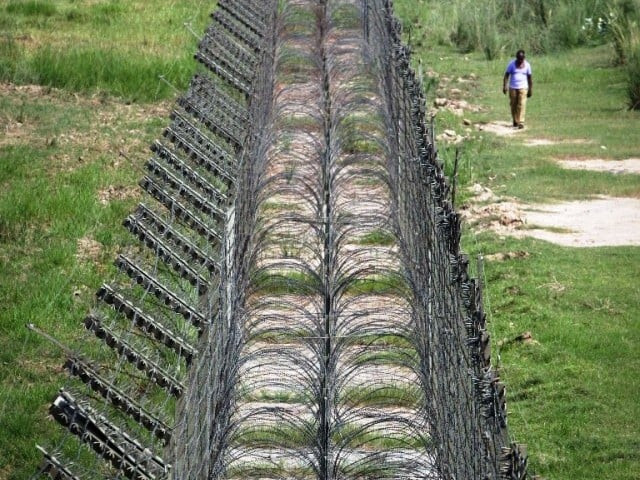Does Kashmir really matter to most Pakistanis?
Never in Pakistan have peasants, artisans, traders, students, taken to streets demanding resolution of Kashmir dispute

PHOTO: REUTERS
Both countries have appalling levels of poverty. Some socioeconomic indicators would illustrate the magnitude of the problem the two countries face. There are more than 400 million people in India who live on less than a dollar a day. Around 45 million Pakistanis share the same fate. Approximately, 27.4 per cent Pakistanis live in severe poverty, with there being more than seven million children who don’t go to school; 40 per cent of children in Pakistan drop out after primary classes. Sanitation programmes cover only 35 per cent of the population. There are millions of homeless in India and 40 per cent of the world’s poor live in that country. Power outages are the order of the day. The Naxalite rebellion has spread to 10 states. Clean drinking water is a luxury that only 30 per cent of the population can enjoy.
But in the face of such heavy odds — the appalling conditions of the living that affect such a large segment of mankind — the two countries are engaged in a fierce and deadly arms race that consumes an astounding amount of scarce resources leaving very little for the socioeconomic sectors. India and Pakistan cumulatively spend more than $44 billion on defence each year. India accounts for nine per cent of all international arms imports. In Pakistan, the defence budget is around Rs750 billion. Nuclear development programmes of the two countries are on a fast track, in fact, they are the fastest growing in the world.
All this emphasis on allocation of resources for defence and its related sectors is justified on the basis of the lingering Kashmir dispute. Pakistan has consistently held the view that relations with India would be normalised only once the Kashmir dispute has been resolved to the satisfaction of the people of Kashmir. The non-resolution of the Kashmir dispute has held both countries hostage for 68 years with there being no end in sight. They are locked in what appears to be an eternal conflict over the control of Kashmir that is couched in diplomatic language as an issue of the right of self-determination of the people of Jammu and Kashmir. Regrettably, the two countries have not evolved any new vision over the possible routes to resolution of the conflict that has so profoundly affected relations between them.
The issue has fundamental relevance for the people residing in Jammu and Kashmir. For them, the continuance of the status quo is no option. That reality has to be acknowledged. But then should Pakistan allow the dispute to hold its relations with a neighbouring country of 1.3 billion people hostage, especially since the disputed territory has never expressed any explicit determination to be a part of Pakistan — not to speak of India’s firm and unambiguous resolve not to allow any adjustment in the border. More importantly, there have been no studies or surveys to show whether the people of Pakistan have any deep attachment to the cause of Kashmiris and whether the dispute has any resonance for the broad majority of the country. What is not realised or is overlooked is that amidst the teeming millions of Pakistan, in Sindh, rural Punjab, Khyber-Pakhtunkhwa and Balochistan, there is no urgent wish to see Kashmir become integrated with Pakistan. The people in all regions of Pakistan are more fixated on issues like poverty, education, jobs, health care, electricity, police excesses, water supply, irrigation, roads, sanitation, corruption in government departments and social injustice. Never in the last many decades have people — the rank and file Pakistanis — ever agitated over the issue of denial of rights to Kashmiris. Never in Pakistan have the peasants, artisans, traders, students, nationalists and liberals taken to the streets demanding that Pakistan continue to press for the resolution of the Kashmir dispute even if that means suspending all cultural and trading contacts with India.
If an issue does not strike any chord with millions of the poor, low and middle income Pakistanis, then why make it an issue of life and death for 200 million citizens of this country? Having said that, it must be recognised that human rights, including the right to choose their government and determine their destiny is, for the people of Jammu and Kashmir, a matter of supreme importance and crucial relevance because they have given immense sacrifices for achieving autonomy. Pakistan must continue to support politically their right to seek more autonomy. But does it follow that it should put its own state at stake for helping Kashmiris win more powers or independence?
When 68 years of struggle have not drawn us any closer to the dream of achieving independence or greater autonomy for the people of Kashmir, should we keep fighting for another 70 years at a still higher cost to our economy and country? And while the world moves on, should Pakistan-India relations remain frozen to the detriment of one-fifth of humanity? There is need for a new approach or thinking on the subject. A new vision, on the one hand, would be premised upon India seeking to confer complete autonomy on Kashmir on the pattern of Hong Kong and Macau vis-a-vis China, and on the other, Pakistan moving to normalise relations with India despite the unresolved border and water issues. Such a vision alone would help transform the subcontinent and its poverty-stricken people who are stuck in a vicious cycle of multidimensional poverty and for whom the future does not hold much promise.
Published in The Express Tribune, September 3rd, 2015.
Like Opinion & Editorial on Facebook, follow @ETOpEd on Twitter to receive all updates on all our daily pieces.















COMMENTS
Comments are moderated and generally will be posted if they are on-topic and not abusive.
For more information, please see our Comments FAQ